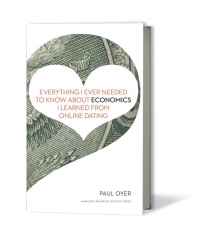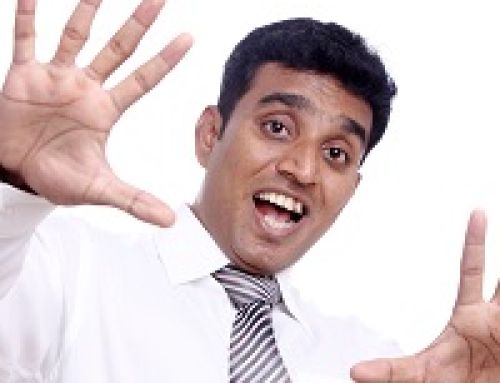Dr. Paul Oyer Interview – Everything I Ever Needed to Know about Economics I Learned from Online Dating
“Everything I Ever Needed to Know About Economics I Learned from Online Dating”
Jasbina Ahluwalia interviews Paul Oyer
A few topics Paul Oyer addresses in this interview are:
- (2:39) Online Dating Like Finding a Job
- (4:16) Lies in Online Dating
- (6:35) Economics of Online Dating
- (12:25) Attraction to Online Profiles
- (15:34) Signaling in Online Dating
- (22:08) Future of Dating Sites
- (25:05) Success in Online Dating: 4 Tips
_____
Paul Oyer is The Fred H. Merrill Professor of Economics at the Stanford Graduate School of Business. He is also a Research Associate with the National Bureau of Economics and the Editor-in-Chief of the Journal of Labor Economics.
Paul does research in the field of personnel economics. In addition, he is the author of two books published in 2014. Everything I Ever Needed to Know About Economics I Learned from Online Dating is an entertaining and non-technical explanation of numerous key ideas in microeconomics using examples from online dating, as well as labor markets and many product markets. Roadside MBA (with Michael Mazzeo and Scott Schaefer) is a non-technical Strategy guide for small businesses based on the authors’ extensive travel around the US interviewing small business owners.
Before moving to the GSB in 2000, Paul was on the faculty of the Kellogg School at Northwestern University. In his pre-academic life, he worked for the management consulting firm of Booz, Allen and Hamilton, as well as for the high technology firms 3Com Corporation and ASK Computer Systems.
He holds a BA in math and computer science from Middlebury College, an MBA from Yale University and an MA and PhD in economics from Princeton University.
When not teaching or doing research, Paul runs, swims, skis, hangs out with his two college-age children and walks his flat-coated retriever.
_____
(00:47): Hello everyone and welcome to Intersections Match’s Talk Radio, a monthly holistic lifestyle show focused on the continual evolution into the best versions of our authentic selves. We and our guests discuss relationships and health and wellness, each of which contributes to meaningful and fulfilling lives.
This is Jasbina, your host. I’m a former practicing lawyer and the Founder of Intersections Match, the only elite national personalized matchmaking company focused on singles of South Asian descent nationwide in the US.
As a dating coach and matchmaker, I’m always interested in fresh perspectives from authors, researchers and experts to help me provide unparalleled service to our clients.
I’m very excited to welcome Paul Oyer to our show today. Paul is a Fred H. Merrill Professor of Economics at the Stanford Graduate School of Business and a former professor at Northwestern University of Kellogg School of Management.
He is the Editor-in-Chief of the Journal of Labor Economics. On today’s show, we’ll be discussing Paul’s book, Everything I Needed to Know About Economics I Learned from Online Dating. Welcome to the show, Paul.
Paul Oyer
(1:44): Thanks for having me.
(1:47): It’s a pleasure to have you on. To start with, I’m sure our listeners will want to know what led you to write this book in the first place.
Paul Oyer
(1:56): I’m a labor economist, so I spend my life studying the way firms and workers get together. I hadn’t really been on the dating market since before I became an economist. When I went back to dating, which I did by online dating in the fall of 2010, I immediately saw the parallels between what I studied as a labor economist and what I was experiencing as someone out in the dating market.
At some point it occurred to me that I’d really like to talk about how the everyday world is shaped by economics, and this just seemed like an obvious starting point for that.
_____
Online Dating Like Finding a Job
(2:39): That’s so interesting. What are some of the most obvious parallels in understanding economics in terms of online dating techniques and strategies?
Paul Oyer
(2:48): Again, drawing the parallel to the job market, online dating or any sort of matchmaking is very similar to finding a job.
They are unlike other markets. All the goods are differentiated. Every potential mate is different from one another.
Similarly, every job is different and every employee is different.
Elaborating on Online Dating Like Finding a Job.
_____
Lies in Online Dating
(4:16): When I think of things that you mentioned, I think about the lying or misrepresentation on online sites.
Do you see that from your experience and find that to be as big of a problem as some people think it is? What can people do about it if it is prevalent?
Paul Oyer
(4:38): It is quite prevalent. The studies on this are very clear. I certainly saw some exaggeration or outright lying.
There is two kinds of lying.
There’s what an economist would call, “cheap talk,” and that’s rationally deciding to misrepresent yourself about your age or weight.
There’s a whole other set of lying that we as economists aren’t very good at understanding.
That’s one of the limits to using economics to explain dating, and that is lying to yourself.
Elaborating on Lies in Online Dating.
_____
Economics of Online Dating
(6:35): Interesting. In terms of the distinction you make, I love it.
If one’s self-perception is one thing, it can be difficult to cross that out. Along those lines of economic mindset, I’m wondering how else it helps give you an edge.
In your experiences, how do you feel that your economic mindset and the principles of economics helped you navigate the whole online dating market?
Paul Oyer
(7:04): I think there are a few simple principles that economics would provide for you. They’re not earth-shattering, but they’re certainly helpful.
One of them is to think about where you can find a big market for the type of person you’re looking for. It’s what an economist would call, “looking for a thick market.”
What you want to do is think about whether you would rather be on Match.com or on some little local dating site, because the choices are going to be much greater.
Elaborating on Economics of Online Dating.
_____
Attraction to Online Profiles
(12:25): Which people have you found that are most sought after on online dating sites? Have you seen any patterns on this?
Paul Oyer
(12:43): The research on this is very clear and it’s a little bit disappointing in some ways. It’s just the way human nature is.
The stereotypes about what men and women are interested in turn out to be true, so the best on-average men care about how women look.
That’s the number one thing that drives their interest in women, who they send messages to and who they want to date.
Women are interested in how much money men make.
Elaborating on Attraction to Online Profiles.
_____
(14:19): I’m curious, did you tell the women from your online dating experience about your book project? What kind of comments did you get and what did they think about it?
Paul Oyer
(14:34): I wouldn’t usually mention it right off the bat, but within a couple of days if it was going anywhere, I would certainly mention it.
I didn’t want anyone to think that I was using them as data. I collected a selected sample, because the only people I mentioned it to were the people where we both had at least enough interest to get to the third date. It was never a problem.
My current girlfriend and I have been going out for two and a half years now. She certainly didn’t mind and thought it was all very entertaining.
Of course she is a political scientist, so by nature she would think that was fine.
The other women I talked to as well generally thought it was interesting and amusing, rather than being offended by it.
______
Signaling in Online Dating
(15:34): In terms of the economic principles, I love how you mentioned some already.
Any other economic principles that you can share with our audience, some of which will include economists like yourself, that they can really start to look at that principle and apply it to this whole dating arena in a different light?
Paul Oyer
(16:00): In order to apply certain ideas from economics, you need a little help from the dating site or an outsider.
For example, one thing that would be nice would be if dating sites helped us by verifying people’s weight, age and salaries. There are a couple foreign websites that do that.
Sometimes it’s hard for us to apply these principles without some help from the dating site.
Elaborating on Signaling in Online Dating.
_____
(20:46): Yes. I want to go a little further with this “two roses” concept. I find that very interesting. You know how you hear that maybe about 20% of people on any given site get 80% of the messages right along the lines of what you just said? If people knew that they only had two roses, would they modify their behavior and choose not to just throw their rose at the top 20%? I’m just curious about that.
Paul Oyer
(21:26): I can’t remember if it had a big effect on who the roses were sent to. How attractive you were had a big effect on how valuable the rose was. This was a one-time thing and I’m not sure that everyone was as effective as they could’ve been at using their rose.
I think over time people would learn how to apply them and you would see that it would affect their behavior. Sometimes in economics we need a little bit of time to get to equilibrium and this one-time experiment may not have gotten us there. It may have, but to be honest, I don’t remember that from the study.
_____
Future of Dating Sites
(22:08): That’s interesting. You had mentioned that the niche sites, given the thick market, have very small pools that may go extinct.
What do you think the online dating site of the future might look like?
Paul Oyer
(22:35): That’s a really good question. What I’m very hopeful for, although I often wonder if I’m just being unrealistic about this, is that the dating site of the future is the one that figures out how to match people better. They’ll get the algorithm down.
Elaborating on Future of Dating Sites.
_____
Success in Online Dating: 4 Tips
(25:05): Yes, it’s funny with Tinder. People can be in a bar, but everyone’s on Tinder and no one is really interacting.
From your experiences, what are your top three tips that you might give singles based on economic principles or your own personal experiences?
Paul Oyer
(25:28): Four Tips for Singles:
- Find the Thickest Market
- Credibility
- Remember, People Don’t Always Tell the Truth
- Understand Assumptions
Elaborating on Success in Online Dating: 4 Tips.
_____
(28:04): Very interesting. I really appreciate you sharing your insights with us. I’m wondering if there are any last thoughts or a take-home message that you’d like to leave our listeners with.
Paul Oyer
(28:23): The simple idea from an economist point of view would be that you have to be in the market to succeed in the market. Get out there. Put yourself out there. Take some chances. Put yourself on a dating site.
My relationship ended up being very successful. We found each other online even though we work 100 yards apart and probably ran into each other all the time.
Find the market that’s thick, which in my case was an online dating market.
We weren’t going to find each other even though we were right under each other’s noses. Get out there. Find the market that works for you and have at it.
_____
(29:04): I love that. Thanks, Paul. It’s been a pleasure to have you on.
Paul Oyer
(29:07): Thank you, it’s been my pleasure.
(29:11): In case you joined us late or would like to share this show with people in your life, I’d like to remind you that today’s radio show will be archived and available as a podcast on Intersections Match’s website, which is www.IntersectionsMatch.com. Paul, did you want to share any website with our listeners if they want to get a copy of your book?
Paul Oyer
(29:32): No, if you just Google “Paul Oyer on Online Dating,” you’ll find your way to Amazon or wherever else you want to buy the book. I’d be very grateful for that.
(29:42): Wonderful. I appreciate you hanging out with us. Make sure to join us for next month’s show. Take care everyone.
_____
Tell Us:
Paul Oyer shared his insights on applying economic theories to online dating. What piece of advice has left you inspired? Share with us in the comments section below.
______





